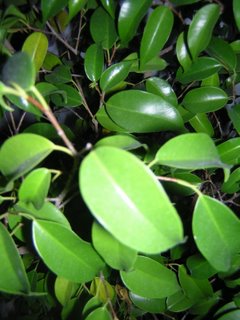Micus
 This ficus tree (a fig of the Moraceae family, but not fruit bearing), also known as the weeping fig and a near neighbor to the rubber tree plant, has been shuttled between indoor winters and outdoor summers since we brought it home in 2002. The idea of this plant, these glossy leaves and its miniature stature, have been with me much longer. Ficus adoration is cultural. This ubiquitous house plant, is actually a native of Malaysia, a tropical country to the southeast of Cambodia and Vietnam. I had one of these standing proudly by my desk when I worked on the 10th floor of a steel and stone office building in Manhattan in 1989. I bought it from a dealer who had dozens just like it, green and healthy standing like an army of life amidst the drab gray concrete and sparkly glassphalt of that raucous metropolis. Within a week, despite direct winter sunlight through tan ultra-violet filtering glass, my tree had yellowed and expelled most of its shiny folliage. Ten million years or more adjusting to a Malaysian climate, then its offspring is seduced into overproduction in a factory greenhouse, and the sapling is hauled unceremoniously into my climate-controlled office building - it is perhaps a good thing that trees have no rapid recourse other than to drop their leaves. At the time, the tree was a way to get closer to natural things, and a way to identify myself or locate myself. I have always brought many plants inside, to be next to me, for this unconscious reason. And I have always held a special place for the ficus. I knew, for instance, that I truly loved my future wife when I saw this beautiful tree growing from the soil in her native city of Buenos Aires, literally, Good Air. They could call it Buena Clima, tambien. The ficus pictured here stopped shedding last summer's leaves in the third week of December. As a species, it is far from home. But as a life form, it has a remarkable sensitivity to the solar calendar. And for its ability to hold my stare and convince me to care for it, to embody memories of a life lived for something, this ficus, and those like it, have to be commended, I think. After all, what is genius but to exploit the accidental for the greater good of all?
This ficus tree (a fig of the Moraceae family, but not fruit bearing), also known as the weeping fig and a near neighbor to the rubber tree plant, has been shuttled between indoor winters and outdoor summers since we brought it home in 2002. The idea of this plant, these glossy leaves and its miniature stature, have been with me much longer. Ficus adoration is cultural. This ubiquitous house plant, is actually a native of Malaysia, a tropical country to the southeast of Cambodia and Vietnam. I had one of these standing proudly by my desk when I worked on the 10th floor of a steel and stone office building in Manhattan in 1989. I bought it from a dealer who had dozens just like it, green and healthy standing like an army of life amidst the drab gray concrete and sparkly glassphalt of that raucous metropolis. Within a week, despite direct winter sunlight through tan ultra-violet filtering glass, my tree had yellowed and expelled most of its shiny folliage. Ten million years or more adjusting to a Malaysian climate, then its offspring is seduced into overproduction in a factory greenhouse, and the sapling is hauled unceremoniously into my climate-controlled office building - it is perhaps a good thing that trees have no rapid recourse other than to drop their leaves. At the time, the tree was a way to get closer to natural things, and a way to identify myself or locate myself. I have always brought many plants inside, to be next to me, for this unconscious reason. And I have always held a special place for the ficus. I knew, for instance, that I truly loved my future wife when I saw this beautiful tree growing from the soil in her native city of Buenos Aires, literally, Good Air. They could call it Buena Clima, tambien. The ficus pictured here stopped shedding last summer's leaves in the third week of December. As a species, it is far from home. But as a life form, it has a remarkable sensitivity to the solar calendar. And for its ability to hold my stare and convince me to care for it, to embody memories of a life lived for something, this ficus, and those like it, have to be commended, I think. After all, what is genius but to exploit the accidental for the greater good of all?It's about tools, not ideology, ultimately. The tools built today have a residual benefit for you and I. This type of electronic space, for instance, was unheard of before the last of the 20th century. But these tools are not built for us. The tools are built by and for centralization and control far stronger, they believe, than any counter trend that democratically minded individuals or groups might foster. They have enormous power, this cannot be denied. In large part this is not only because they have legalized a form of resource control that keeps their institutions flush most of the time, it is also because you and I do not carve out our own space apart from these institutions and their interests. We must take our own hand at creating sustainable practices that will liberate us from the shackles of overproduction and capital concentration. We need ideas that appeal like the form of the ficus tree, beautiful to the senses and seductive to the imagination.

0 Comments:
Post a Comment
<< Home